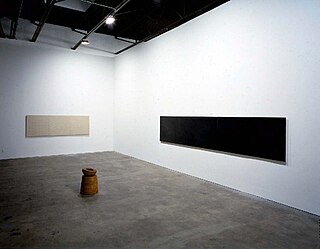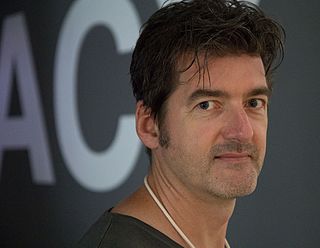The Istanbul Biennial is a contemporary art exhibition that has been held biennially in Istanbul, Turkey, since 1987. The Biennial has been organised by the Istanbul Foundation for Culture and Arts (IKSV) since its inception.

Founded in 1990, the Center for Curatorial Studies, Bard College is an exhibition and research center dedicated to the study of art and exhibition practices from the 1960s to the present. The Center initiated its graduate program in 1994 and is one of the oldest institutions in curatorial pedagogy, offering a two-year graduate-degree program in curating. Hundreds of curators, writers, critics, artists, and scholars taught seminars and lectured in practicums. The Center alumni/ae include more than 200 individuals working in contemporary art field in the U.S. and internationally.

Basak Senova is an art curator, writer and designer from Istanbul, Turkey. She lives and works in Vienna since 2017.
Vasif Kortun is a curator, writer and educator in the field of contemporary art, its institutions, and exhibition practices. Kortun served as the founding director of several international institutions, including SALT, Platform Garanti Contemporary Art Center, Proje4L, and the Museum of the Center for Curatorial Studies, Bard College. In 2006, he received the Award for Curatorial Excellence from the Center for Curatorial Studies for his "experimental approach and openness to new ideas to challenge the contemporary art world and push its parameters beyond national or international, local or global developments." Kortun has written extensively on contemporary art and visual culture in Turkey for publications and periodicals internationally. He currently lives in Ayvalık, a seaside town on the northwestern Aegean coast of Turkey.
Charles Esche is a museum director, curator and writer. His focus is on art and how it reflects, provokes and influences changes in society. He lives between Edinburgh and Eindhoven.

SITE Santa Fe is a nonprofit contemporary arts organization based in Santa Fe, New Mexico. Since its founding in 1995, SITE Santa Fe has presented 11 biennials, more than 90 contemporary art exhibitions, and works by more than 800 artists. Following its presentation of the first international biennial of contemporary art in the U.S., SITE expanded its programming to include ongoing exhibitions of notable artists in solo and group shows, often including new commissions and U.S. debuts. While SITE presents artists from all over the world, it has also provided support and career development opportunities for local New Mexico talent. Approximately 20% of the exhibited artists are based in New Mexico.

Oliver Ressler is an artist who lives and works in Vienna. He produces theme-specific exhibitions, projects in the public space and videos on issues such as global capitalism, forms of resistance, social alternatives, racism and global warming. His work constantly tries to blur boundaries between art and activism.
Ahmet Öğüt is a conceptual artist living and working in Amsterdam, Netherlands and Berlin, Germany. He works with a broad range of media including video, photography, installation, drawing and printed media.
Xurban collective was an international art collective founded in 2000. Core members of the group are Guven Incirlioglu and Hakan Topal, whose transatlantic collaborations took the form of media projects and installations. xurban_collective's projects instigate the questioning, examination, and discussion of contemporary politics, theory, and ideology, utilizing documentary photography, video, new media and text. The collective focuses specifically on areas of regional conflicts, military spatial confinement, urban segregation and neoliberal exclusion strategies. In September 2012 xurban_collective members concluded their collaboration to focus on their personal projects, artistic research and production.
Hakan Topal is an artist living and working in Brooklyn, New York. He was the co-founder with Guven Incirlioglu of xurban collective (2000–12), and is known for his research-based conceptual art practice. He is an Associate Professor of New Media and Art+Design at Purchase College, SUNY.
Mladen Stilinović was a Croatian conceptual artist and one of the leading figures of the so-called "New Art Practice" in Croatia. He lived and worked in Zagreb, Croatia.

SALT is a Turkish contemporary art institution. It was started by Vasif Kortun and Garanti Bank in 2011, and has exhibition and workshop spaces in Istanbul and Ankara, Turkey. It combines the previous activities of the Garanti Gallery, the Ottoman Bank Archives and Research Centre and the Platform Garanti Contemporary Art Center of the bank. It is one of the six members of L'Internationale, a confederation of European art institutions; the other member institutions are the Moderna galerija in Ljubljana, in Slovenia; the Museo Nacional Centro de Arte Reina Sofía in Madrid, in Spain; the Museu d'Art Contemporani de Barcelona in Barcelona, also in Spain; the Museum van Hedendaagse Kunst Antwerpen in Antwerp, in Belgium; and the Van Abbemuseum in Eindhoven, in the Netherlands.

Founded in March 1997 by the Ottoman Bank in collaboration with the History Foundation, the Ottoman Bank Archives and Research Centre (OBARC) operated in the former Head Office of the Ottoman Bank in Istanbul, Turkey from 1999 to 2010. Its projects included 400 conferences, symposia, workshops and exhibitions; as well as 70 publications and a bi-annual prize competition.

Garanti Gallery (GG) was a cultural institution based in Istanbul, Turkey, specializing in design, architecture and urbanism. Through its various exhibitions, lectures, conferences, workshops and publications, GG filled a great gap regarding its areas of expertise in the city and the country in general. GG was the first venue in Turkey to host the exhibitions of works by internationally renowned architects and designers such as Steven Holl, Zaha Hadid, Archigram, Hella Jongerius, Konstantin Grcic, Ezri Tarazi, and Yossi Lemel.

Anton Vidokle is an artist and founder of e-flux. Born 1965, Vidokle lives in New York and Berlin.
Ashkal Alwan, the Lebanese Association for Plastic Arts, is a non-profit organization that promotes contemporary art practices in Lebanon and the broader region.
Libia Castro and Ólafur Ólafsson are collaborative artists based in Rotterdam and Berlin.

Galit Eilat, born 1965 in Israel, is an independent curator and writer living in the Netherlands.
Anne Barlow is a curator and director in the field of international contemporary art, and is currently Director of Tate St Ives, Art Fund Museum of the Year 2018. There she directs and oversees the artistic vision and programme, including temporary exhibitions, collection displays, artist residencies, new commissions, and a learning and research programme. At Tate St Ives, Barlow has curated solo exhibitions of work by artists including Thảo Nguyên Phan (2022), Petrit Halilaj (2021), Haegue Yang (2020), Otobong Nkanga (2019), Huguette Caland (2019), Amie Siegel (2018) and Rana Begum (2018). She was also co-curator of "Naum Gabo: Constructions for Real Life" (2020) and collaborating curator with Castello di Rivoli, Turin for Anna Boghiguian at Tate St Ives (2019).
Hale Tenger is a visual artist based in Istanbul. She is known for her large-scale installations that explore identity, collective memory, and political violence.










